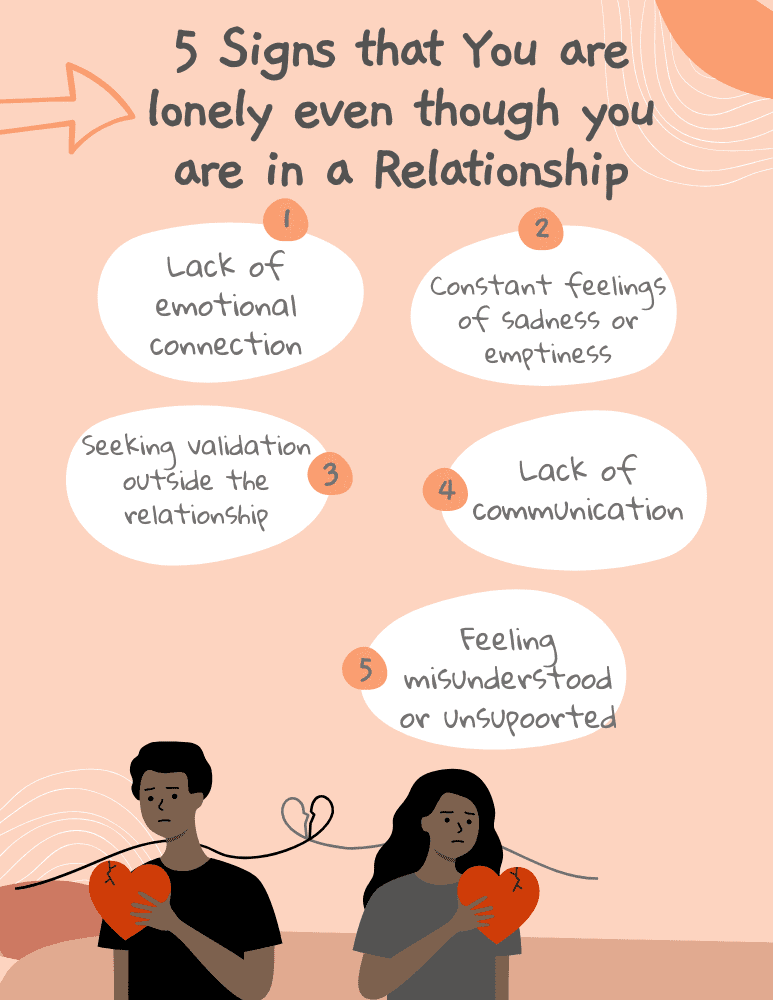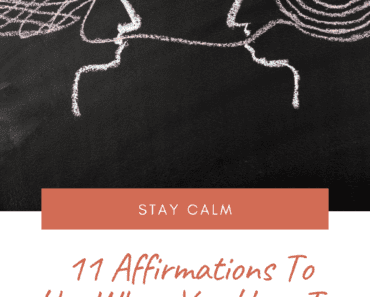Loneliness can be a silent shadow that lingers quietly in the corners of a relationship, often unseen and unrecognized. It’s a common misconception that being in a relationship automatically shields one from feeling lonely; however, the truth tells a different story. Let’s delve into the telltale signs that you may be experiencing loneliness even when you’re not alone, how it happens, its effects, and, importantly, how to overcome this invisible divide.
5 BIG Signs of Loneliness in a Relationship

There are some distinct signs that can indicate you are feeling lonely in your relationship. These include:
1. Lack of Emotional Connection
When you feel like your partner is physically there, but emotionally a world away, it’s as if a vast silence resonates through the core of your relationship. This lack of emotional connection means you’re missing the warmth and intimacy that comes from sharing thoughts, feelings, and experiences.
Like two parallel lines that never meet, your lives may run alongside each other without truly intersecting. This can leave you feeling like you’re alone in your journey, yearning for that heartfelt bond that makes everything seem brighter when shared with someone you love.
Remember, absence doesn’t just relate to physical presence; it’s the emotional engagement that fills the spaces between us.
2. Constant Feelings of Sadness or Emptiness
Experiencing constant feelings of sadness or emptiness can be like a whisper in your heart, signaling that something’s missing in your relationship and you feel lonely.
It’s like when you sit next to your partner but find your joy isn’t as bright, your laughter not as deep. That’s when you might realize that you’re longing for a connection that nourishes your spirit.
These emotions are telling you that your needs for companionship, understanding, and love aren’t being met.
It’s completely natural to feel this way, and acknowledging these feelings is the first step towards bridging the gap that loneliness creates. After all, every one of us deserves to feel truly seen, heard, and valued by our significant other.
3. Seeking Validation Outside the Relationship
When we start to seek validation outside of our relationship, it’s often a whisper to ourselves that we’re lonely and longing for something more, something that perhaps we aren’t receiving from our partner.
It’s like reaching for a lifeline, craving the acknowledgment and acceptance that we might feel is lacking at home.
While it’s natural to enjoy positive reinforcement from friends, family, or even colleagues, relying on these external sources of approval can highlight the loneliness within our primary relationship. It reminds us that we all need to feel appreciated and understood, and if these emotional needs are not fulfilled by our partner, we may unconsciously start looking elsewhere to fill that void.
Remember, seeking validation outside of the relationship is a sign that you are lonely and what you’re yearning for is genuine connection – a connection where you feel wholly recognized and valued, not just for what you do, but for who you are.
4. Lack of Communication or Meaningful Conversations
The absence of meaningful communication or deep conversations within a relationship can be akin to slowly losing the colors in a beautiful painting; everything is still there, but the vibrancy and connection to the image begin to fade.
When we stop sharing our hopes, fears, and daily experiences with our partner, or when our interactions become purely transactional — about the grocery list, the bills, or the logistics of life — we miss out on the emotional intimacy that binds two souls together.
This emotional distance can be a profound indicator of loneliness, a sign that we crave a stronger, more heartfelt connection.
5. Feeling Misunderstood or Unsupported
Feeling misunderstood or unsupported in your relationship is like walking through a maze without a map. It can stir a sense of isolation, even when you’re physically close to your significant other.
When our feelings or challenges are met with indifference or misunderstanding, it’s as though our inner world becomes invisible to the person who’s supposed to know it best.
These feelings can make us feel deserted on an emotional level, because support and understanding are the very foundations of a healthy partnership.
It’s natural to crave a partner who will not just listen, but truly hear you, and offer a shoulder to lean on when you navigate life’s twists and turns. If these elements wane, loneliness can settle in, making us feel adrift in the one relationship that’s meant to anchor us.
4 Causes of Loneliness in a Relationship
Loneliness in a relationship doesn’t just happen out of nowhere. There are some reasons we start to feel lonely in a relationship and why that loneliness gets heavier and heavier.
1. Busy Schedules and Lack of Quality Time
In the hustle and bustle of life, we’ve all been there — overbooked schedules that leave little room for quality time with our significant others. It’s as if we’re spinning on separate carousels, occasionally waving at each other as we pass by.
But let’s be real, those quick waves don’t substitute for a heart-to-heart conversation or shared laughter.
When we’re swamped with work, personal projects, or social obligations, it’s too easy for couple time to slip down the priority ladder. And before you know it, you’re both physically present but emotionally worlds apart, leading to that pang of loneliness, even when you’re sitting side by side.
That sense of togetherness thrives on moments spent deeply engaged with one another, and without that, loneliness tends to sneak in, silently building a wall between two connected hearts.
2. Communication Issues and Unresolved Conflicts
Good communication is the glue that holds relationships together. When that glue starts to dissolve, it’s like a slow leak in a tire; you may not notice it right away, but over time it can cause you to come to a standstill.
We all yearn to be heard and understood, but if we’re dodging tough conversations or stonewalling instead of opening up, we’re building walls instead of bridges.
Add unresolved conflicts to the mix, and you’ve got the perfect storm for emotional distance and feeling lonely. It’s like walking on a beautiful beach but carrying a heavy rock; the initial beauty fades in light of the burden.
3. Emotional Neglect or Lack of Intimacy
Emotional intimacy is like the warm sun that helps a garden grow; it strengthens and nourishes the relationship, ensuring that both partners flourish. Without it, though, a chill settles in—the uncomfortable cold of emotional neglect.
It’s those little things, really: the good morning kisses that stop, the “how was your day” chats that become obsolete. It’s in these small moments of neglect where loneliness begins to root.
When we no longer share those private jokes or whisper our dreams in the dark, we miss out on the deep connection that intimacy brings and we start to feel lonely.
Loneliness often sneaks in not in the absence of people, but in the absence of understanding, caring, and being connected on that profoundly personal level.
It’s like when you start feeling like roommates instead of soulmates; you’re there, yet not there for each other, and that’s when the pangs of loneliness start to quietly echo in the heart.
4. Misaligned Values or Goals
When partners’ values or life goals aren’t aligned, it’s like two compasses pointing in different directions—you might walk side by side for a while, but eventually, your paths start to diverge.
It’s not about the big disagreements—those are clear and can often be negotiated. Rather, it’s the subtle mismatch in what you hold dear, how you prioritize your life, and what you envision for the future.
Unrealistic relationship expectations also fall under this category. When one partner expects the other to change or fit into their mold, it’s setting both up for disappointment and resentment.
Maybe one dreams of a bustling city life while the other yearns for quiet countryside evenings.
Perhaps one prioritizes career while the other seeks a sanctuary in family life.
These discrepancies can create a gap, a silent void filled with loneliness because even in each other’s company, you’re each looking out at a different horizon, yearning for support and companionship on a journey that you’re not on together.
4 Effects of Loneliness on Individuals and Relationships
How does loneliness in a relationship affect us? The short answer is that it can take a toll on our entire lives, affecting everything else we do negatively. Following are 4 results of feeling lonely.
1. Decreased Overall Happiness and Satisfaction
Loneliness in a relationship can be like a slow drip in an otherwise full bucket of happiness and satisfaction. Over time, that bucket can get dangerously low.
When we’re lonely, it isn’t just about being alone—it’s about feeling disconnected from our partner, as though we’re not sharing in life’s journey as we once did. This sense of isolation can cast a shadow over the joy we usually find in our lives together, dimming the satisfaction we once took for granted.
Activities that used to warm our hearts might feel colorless, and achievements that should fill us with pride might seem less rewarding.
Loneliness acts as a barrier, separating us not just from each other, but also from the best versions of our lives, fostering a sense of emptiness even in shared experiences.
2. Increased Risk of Infidelity or Seeking Emotional Connection Elsewhere
The pain of loneliness can silently beckon individuals to search for solace outside their relationship, quite simply because they crave the connection that’s missing at home.
It’s human nature to seek out emotional warmth when we’re feeling cold inside. This isn’t about being unfaithful at heart, but rather about longing for a significant connection—a friendly conversation, a shared laugh, an empathetic ear—that fills the void created by loneliness.
It’s when these once-simple needs become unmet in a relationship that the risk of infidelity or searching for an emotional bond elsewhere increases.
3. Negative Impact on Mental and Physical Health
Loneliness can be more than just an emotional ache; it can ripple out, touching every facet of our wellbeing.
When we are lonely, our mental health can take a significant hit. We may experience increased stress, anxiety, or depression, which can make us retreat even further into our solitude.
This retreat is not just mentally taxing—it can take a physical toll as well. The stress from feeling disconnected can weaken our immune system, disrupt our sleep, and even lead to more serious health problems over time.
It’s like a feedback loop where emotional strain aggravates physical health, and the physical ailments in turn deepen the emotional turmoil.
Taking care of our hearts, in the emotional sense, is just as critical as looking after our bodies, because they are deeply intertwined.
4. Potential For Deterioration of the Relationship
When you are feeling lonely in a relationship, it’s almost like trying to hold a conversation across a great distance; despite your shouts, the words fall away, carried off by the wind.
This drifting isn’t a given, mind you. With awareness and effort, the tide can be turned. But it’s a poignant reminder of why it’s so important to nurture that connection—together—before the silence grows too profound.
5 Strategies to Overcome Loneliness in a Relationship
If you know you feel lonely, even though you are in a relationship, it’s time to take action. Doing nothing will result in a more profound loneliness that impacts your life even more negatively.
1. Open and Honest Communication
Open and honest communication is akin to a lifeline tossed across the chasm of loneliness in a relationship. It allows us to express our deepest fears, our unmet needs, and the quiet yearnings that linger beneath the surface.
For example, when one partner feels neglected due to the other’s demanding career, it’s the courage to voice out, “I miss our time together; it feels like work is always your priority,” that can initiate a healing dialogue.
Similarly, admitting, “I feel alone when we don’t share our daily experiences,” can nudge both partners to carve out moments for reconnection amidst life’s whirlwinds.
Through such verbal exchanges, misunderstandings are clarified, and feelings are validated, slowly bridging the emotional distance that solitude had widened.
2. Prioritizing Quality Time and Meaningful Activities Together
Quality time is a fundamental ingredient in the recipe of a healthy relationship; it’s the shared moments and experiences that weave the fabric of intimacy. When life’s relentless pace pulls us in different directions, it is these purposeful periods of togetherness that remind us of our partnership’s unique tapestry.
Setting aside time for a weekly date night, whether it’s trying out a new restaurant or simply enjoying a movie night in, ensures that these threads of closeness remain intact.
Engaging in meaningful activities together, such as enrolling in a dance class or volunteering for a cause close to your hearts, not only creates memories but also strengthens bonds.
These experiences become the shared stories you’ll reminisce about, the private jokes that only you two understand, and the mutual support system that holds steadfast in the face of external chaos. They are the antidote to disconnection, the lifeline that pulls you back from the brink of emotional isolation to the warm embrace of shared existence.
3. Seeking Professional Help or Counseling
As we navigate the complexities of a relationship, the journey can often take us through uncharted emotional territories where we find ourselves at a loss. Seeking professional help or counseling is akin to using a compass to guide us through these unknown lands.
Therapists offer a unique perspective, one honed by years of training and experience in the human condition, which can illuminate the intricate patterns and cycles that we may unwittingly repeat.
For instance, a couple might find themselves trapped in an argumentative loop over financial decisions, unaware that the root of their discord lies in a difference in fundamental values shaped by their upbringings. A counselor acts as a neutral mediator, who can help unearth these underlying issues, enabling couples to understand each other on a deeper level.
They teach us the language of our own emotions, helping us to articulate our needs and fears without the cloud of judgment—this can be a powerful antidote to loneliness.
Counseling isn’t merely about solving problems; it’s about fortifying the relationship with the tools and insights necessary for growth and resilience.
It means building a safe space where both partners can be vulnerable, and from this vulnerability, find strength in one another. This strategy has turned the tide for many couples, reigniting the flame of companionship that once seemed at risk of being extinguished.
Check out flexible online couples therapy here.
4. Working on Personal Growth and Self-Care
Personal growth and self-care are crucial for fostering a healthy relationship because they allow us to be the best version of ourselves for our partners.
When we neglect our own needs, we risk becoming emotionally depleted, unable to offer support, understanding, or affection to those we love.
By investing time in activities that nourish our bodies and minds, such as meditation, exercise, or pursuing a hobby, we not only enhance our self-esteem and happiness but also bring a more positive and engaged presence into our relationships.
For example, someone who dedicates time to learning a new language or skill not only expands their own horizons but also brings new topics and excitement into conversations with their partner. This self-improvement can reignite the shared curiosity and growth that may have been the foundation of the relationship initially.
Moreover, the act of self-care, be it a weekly spa day or just setting aside time to read, can function as a reminder that personal fulfillment contributes to a richer, more diverse partnership where mutual support thrives.
The self-awareness that comes with personal growth encourages better communication and the understanding that each individual’s happiness is interlinked, yet independent—a balance that is key to overcoming feelings of loneliness within a coupling.
5. Reevaluating the Relationship and Considering Necessary Changes
Reevaluating the relationship is a critical step in confronting loneliness because it often uncovers underlying issues that have gone unaddressed. It’s much like tending to a garden—sometimes we need to step back, assess the health of the plants, and determine where our attention is required most.
We may find that what we’ve been neglecting is the very thing that once brought us joy together. For instance, a couple might discover they’ve been so consumed by their routines that they’ve stopped making time for date nights or deep conversations, leading to feelings of isolation even when they’re together.
By periodically asking ourselves and each other what we need or desire, and what might be missing or has changed, we encourage an openness that can reignite connection and intimacy. It’s through this lens of honesty and change—whether it means revamping date nights to be more engaging, finding new shared interests, or tackling individual behavior patterns—that couples can actively fight against the creep of loneliness and reinforce the strength of their bond.
Don’t Lose Hope If You’re Lonely Even Though You’re In A Relationship
Loneliness is a clear signal—not necessarily of a flawed relationship, but of a need for growth, attention, and perhaps change. It invites us to deepen our self-awareness and take active steps towards healing—both individually and together.
If loneliness has been your silent companion, it may be time to break the silence, to reach out and find the joy and connection that everyone deserves in a partnership.





